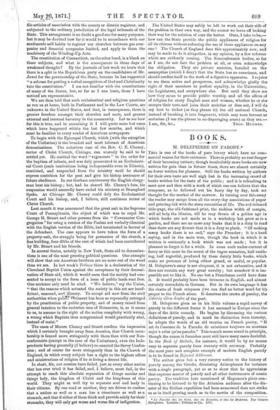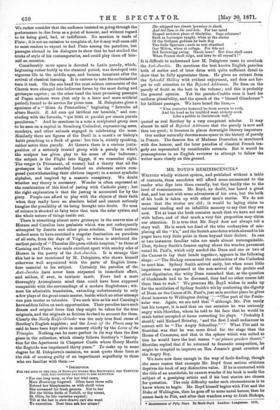BOOKS.
M. DELEPIERRE ON PARODY.*
Tars is one of the books of pure luxury which have no com- mercial reason for their existence. There is probably no real danger- of their becoming extinct; though incalculably more books are now written for gain than in former times, there are almost certainly no fewer written for pleasure. Still the books written by authors for their own taste are well nigh lost in the increasing crowd of books written for the taste of the public ; and it is refreshing to meet now and then with a work of which one can believe that tha- composer, as he followed out his fancy day by day, took no. thought for the market of the morrow. In turning over this essay the reader may escape from all the every-day associations of paper and printing-ink with the stern necessities of life. The red-letterecl title-page, the old-fashioned print, the reckless width of margin*
will all help the illusion, till he may dream of a golden age in which books are not made as in a workshop but grow as in a garden, and there are no more any books that it is a duty to rear) than there are any flowers that it is a duty to pluck. " Of making many books there is no end," says the Preacher ; it is a hard saying, and in the main true, though the book in which it is
written is eminently a book which was not made ; but it is pleasant to forget it for a while. In some such under-current of
fancy as this must be the secret of the vague sensation, half sooth- ing, half regretful, produced by these dainty little books, which make no pretence of being either grand, or useful, or popular.
M. Delepierre's essay is not eloquent, it is not exhaustive, and it does not contain any very great novelty ; but somehow it is lm,. possible not to like it. No one but a Frenchman could have done
it. It would probably have been tiresome in English, and almost certainly unreadable in German. But in its own language it has the charm of fresh crispness (we can find no better word for it). proper to the French alone. It deserves the crown of parsley, the ELOakic siiXow &seou of the poet.
M. Delepierre gives us in his little volume a rapid survey or parody in the different forms it has assumed in Europe since the-
days of the Attic comedy. He begins by discussing the various definitions of parody, and to mark its distinction from travesty, he adopts the words of an old treatise on French poetry, "
est de l'essence de la Parodie de substituer toujours un nouveau, sujet h celui qu'on parodie." This remark seems sound in principle,.
though the canon it furnishes must still leave many cases doubtful. In the Book of Ballads, for instance, it would be by no means easy to separate parody from travesty with accuracy. Probably the most pure and complete example of modern English parody is to be found in Rejected Addresses.
The author gives but a very cursory notice to the history of parody among the Greeks, dismissing Aristophanes for instance
with a single paragraph, yet so as to show that he appreciates
that supreme master of parody and all other instruments of comic. poetry. The tradition here mentioned of Hegemon's piece con-
tinuing to be listened to by the Athenian audience after the dis- aster of the Sicilian expedition had been announced does not strike- us as in itself proving much as to the merits of the composition..
• La Parodic du let Grecs, cher lee Romaine, et clue is Moderns. Par Octave, Delepierre. Londres : Trtibner at Cie. 1870.
We rather consider that the audience insisted on going through the performance in due form as a point of honour, and without regard to its being good, bad, or indifferent. No mention is made of Plato ; it is not an omission to complain of, for it may well seem odd to moat readers to expect to find Plato among the parodists, but passages abound in his dialogues to show that he had studied the tricks of style of his contemporaries, and could play them off him- self on occasion.
Considerably more space is devoted to Latin parody, which, beginning rather feebly in the classical period, was developed into vigorous life in the middle ages, and became luxuriant after the revival of classical learning. It is curious to note the ecclesiastical turn it took. On the one hand the most solemn ceremonies of the Church were changed into ludicrous forms by the most daring and grotesque caprice ; on the other hand the least promising passages of Pagan authors were (but only in a later and more artificial period) forced to do service for pious uses. M. Delepierre gives a specimen of a " Missa de Potatoribus," beginning " Iutroibo ad altare Bacchi. R. Ad eum qui ltificat cor hominis," and con- cluding with the formula, "qui bibit et poculat per omnia pocula poculorum." And he mentions in a note a sculptured group once to be seen on a capital in Strasburg Cathedral, representing asses, monkeys, and other animals engaged in celebrating the mass. Similarly there are figures of the Devil in a monk's or bishop's habit preaching to a flock of geese: but this is, strictly speaking, rather satire than parody. At Geneva there is a curious juxta- position of a seriously treated group with a parody in which the sculptor has given play to his sense of the ludicrous ; the subject is the Flight into Egypt, if we remember right. The verger (a Protestant, of course) had a theory that all the grotesques in the cathedral formed an elaborate satire com- posed (notwithstanding their obvious import) in a secret symbolic alphabet, and inspired by a masonic conspiracy. We doubt whether any theory is necessary. Wonder is often expressed at the combination of this kind of jesting with Catholic piety ; but the right explanation is that the jesting is accounted for by the piety. People can afford to play with the objects of their faith when they really have an absolute belief and cannot seriously imagine the possibility of its being brought into doubt. No man of science is shocked at fairy tales that turn the solar system and the whole nature of things inside out.
There is something almost more grotesque in the conver sion of Horace and Catullus into psalmists which was not unfrequently attempted by Jesuits and other pious scholars. 'These authors indeed seem to have exercised a singular fascination on parodists of all sorts, from the days of Virgil, to whom is attributed the earliest parody of " Pha-selus ille quern videtis hospites," to those of Canning and Frere, who made excellent sport with sundry odes of Horace in the poetry of the Anti-Jacobin. It is strange that this last is not mentioned by M. Delepierre, who shows himself otherwise well acquainted with the parts of English litera- ture material to his subject. Certainly the parodies of the Anti-Jacobin have never been surpassed in immediate effect, and seldom, if ever, in intrinsic merit. Frere had a more thoroughly Aristophanic mind than could have been supposed compatible with the surroundings of a modern Englishman ; wit- ness his admirable translation, extending unfortunately to only a few plays of the great comic master, beside which no other attempt can pass muster as tolerable. Two such wits as his and Canning's have seldom fallen on such opportunities. Their parodies have such fitness and original force that they might be taken for the true .originals, and the originals as fictions devised to account for them. Clearly the Needy Knife-Grinder was the only true final cause of Southey's English sapphics ; and the Loves of the Plants may be said to have been kept alive in memory chiefly by the Loves of the Triangles. Nothing can be more perfect in its way than the first piece in the collection, which closely follows Southey's "Inscrip- tion for the Apartment in Chepstow Castle where Henry Martin the Regicide was imprisoned thirty years." To make up in some degree for M. Delepierre's omission, we must quote these lines at the risk of seeming guilty of an impertinent superfluity to those who are familiar with them :—
INSCRIPTION.
FOR THE DOOR OF THE CELL IN NEWGITE WHERE MES.BEOWNRI00, THE 'PRENTICE- CIDE, WAS CONFINED PREVIOUS TO HER EXECUTION.
"For one long term, or e'er her trial came,
Here Brownrigg lingered. Often have these cells
Echoed her blasphemies, as with shrill voice She screamed for fresh geneva. Not to her
Did the blithe fields of Tothill, or thy street, St. Giles, its fair varieties expand;
Till at the last in slow-drawn cart she went
To execution. Dost thou ask her crime ?
She whipped two female 'prentices to death,
And hid them in the coal-hole. For her mind
Shaped strictest plans of discipline. Sage schemes I Such as Lycnrgus taught, when at the shrine Of the Orthyan goddess he bade flog The little Spartans ; such as erst chastised Our Milton, when at college. For this act Did Brownrigg swing. Harsh laws ! But time shall come When France shall reign, and laws be all repeal'd !"
It is difficult to understand how M. Delepierre came to overlook the Anti-Jacobin. He mentions the best known English parodies both of earlier and of later dates with quite sufficient detail to
show that he fully appreciates them. He gives an extract from the Splendid Shilling with evident enjoyment, and does not for-
get to call attention to the Rejected Addresses. He fixes on the parody of Scott as the best in the volume ; and this is probably the general opinion. Yet the pseudo-Crabbe runs it hard for uniform plausibility, and the speech of the " blessed Glendoveer " for brilliant passages. We have heard the lines,—
"Nine centuries bounced he from cavern to rock, And his head as he tumbled went nickety-nook Like a pebble in Carisbrook well,"
quoted as real Southey by a very competent scholar. It may almost be said of Rejected Addresses that the parody is now and then too good ; it becomes in places downright literary imposture Our author naturally devotes some space to the history of parody in France. The famous flea of Madame Desroches is mentioned with due honour, and the later parodies of classical French tra- gedy are represented by considerable extracts. But it would be presumptuous in an English reviewer to attempt to follow the writer more closely on this ground.



































 Previous page
Previous page